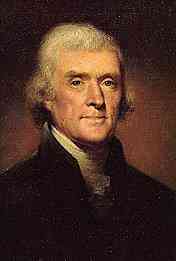
To General James Breckinridge Monticello, February 15, 1821DEAR SIR,-- I learn, with deep affliction, that nothing is likely to be done for our University this year. So near as it is to the shore that one shove more would land it there, I had hoped that would be given; and that we should open with the next year an institution on which the fortunes of our country may depend more than may meet the general eye. The reflections that the boys of this age are to be the men of the next; that they should be prepared to receive the holy charge which we are cherishing to deliver over to them; that in establishing an institution of wisdom for them, we secure it to all our future generations; that in fulfilling this duty, we bring home to our own bosoms the sweet consolation of seeing our sons rising under a luminous tuition, to destinies of high promise; these are considerations which will occur to all; but all, I fear, do not see the speck in our horizon which is to burst on us as a tornado, sooner or later. The line of division lately marked out between different portions of our confederacy, is such as will never, I fear, be obliterated, and we are now trusting to those who are against us in position and principle, to fashion to their own form the minds and affections of our youth. If, as has been estimated, we send three hundred thousand dollars a year to the northern seminaries, for the instruction of our own sons, then we must have there five hundred of our sons, imbibing opinions and principles in discord with those of their own country. This canker is eating on the vitals of our existence, and if not arrested at once, will be beyond remedy. We are now certainly furnishing recruits to their school. If it be asked what are we to do, or said we cannot give the last lift to the University without stopping our primary schools, and these we think most important; I answer, I know their importance. No body can doubt my zeal for the general instruction of the people. Who first started that idea? I may surely say, myself. Turn to the bill in the revised code, which I drew more than forty years ago, and before which the idea of a plan for the education of the people, generally, had never been suggested in this State. There you will see developed the first rudiments of the whole system of general education we are now urging and acting on: and it is well known to those with thom I have acted on this subject, that I never have proposed a sacrifice of the primary to the ultimate grade of instruction. Let us keep our eye steadily on the whole system. If we cannot do every thing at once, let us do one at a time. The primary schools need no preliminary expense; the ultimate grade requires a considerable expenditure in advance. A suspension of proceeding for a year or two on the primary schools, and an application of the whole income, during that time, to the completion of the buildings necessary for the University, would enable us then to start both institutions at the same time. The intermediate branch, of colleges, academies and private classical schools, for the middle grade, may hereafter receive any necessary aids when the funds shall become competent. In the mean time, they are going on sufficiently, as they have ever yet gone on, at the private expense of those who use them, and who in numbers and means are competent to their own exigencies. The experience of three years has, I presume, left no doubt that the present plan of primary schools, of putting money into the hands of twelve hundred persons acting for nothing, and under no responsibility, is entirely inefficient. Some other must be thought of; and during this pause, if it be only for a year, the whole revenue of that year, with that of the last three years which has not been already thrown away, would place our University in readiness to start with a better organization of primary schools, and both may then go on, hand in hand, for ever. No diminution of the capital will in this way have been incurred; a principle which ought to be deemed sacred. A relinquishment of interest on the late loan of sixty thousand dollars, would so far, also, forward the University without lessening the capital. But what may be best done I leave with entire confidence to yourself and your colleagues in legislation, who know better than I do the conditions of the literary fund and its wisest applications and I shall acquiesce with perfect resignation to their will. I have brooded, perhaps with fondness, over this establishment, as it held up to me the hope of continuing to be useful while I continued to live. I had believed that the course and circumstances of my life had placed within my power some services favorable to the outset of the institution. But this may be egoism; pardonable, perhaps, when I express a consciousness that my colleagues and successors will do as well, whatever the legislature shall enable them to do. I have thus, my dear Sir, opened my bosom, with all its anxieties, freely to you. I blame nobody for seeing things in a different light. I am sure that all act conscientiously, and that all will be done honestly and wisely which can be done. I yield the
concerns of the world with cheerfulness to those who are appointed in
the order of nature to succeed to them; and for yourself, for our
colleagues, and for all in charge of our country's future fame and
fortune, I offer up sincere prayers. |
